| Reviews & Columns |
|
Reviews DVD TV on DVD Blu-ray 4K UHD International DVDs In Theaters Reviews by Studio Video Games Features Collector Series DVDs Easter Egg Database Interviews DVD Talk Radio Feature Articles Columns Anime Talk DVD Savant Horror DVDs The M.O.D. Squad Art House HD Talk Silent DVD
|
DVD Talk Forum |
|
|
| Resources |
|
DVD Price Search Customer Service #'s RCE Info Links |
|
Columns
|
|
|
Tin Drum: Criterion Collection, The
In 1979, The Tin Drum (Die Blechtrommel) was honored with the Academy Award for Best Foreign Film. Less than 20 years later, this same film was banned in the state of Oklahoma for allegedly containing scenes that depicted child pornography. Whether or not this charge was justified is a simple matter of personal opinion; by viewing certain scenes individually, this film certainly pushed the boundaries of what might be considered "acceptable". However, viewing of The Tin Drum in its entirety allows the viewer to see the whole picture: a story of a young boy, raised in pre-WWII Germany, who refuses to grow up.
The boy in question is one Oskar Matzerath, played to perfection by David Bennent. In young Oskar, we see a child who is born with wisdom and intellect well beyond his years. Through his eyes, he sees the foolishness of the adults around him, and decides to stop growing after his third birthday. Oskar goes nowhere without the tin drum his mother gave him, and pounds on it in protest of what goes on around him. If anyone tries to take it from him, he emits a high-pitched shriek capable of shattering glass. Still, the driving concept of the film is this: even though he grows older and experiences new things, Oskar's appearance remains that of a young boy.
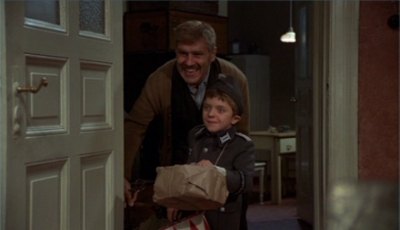
Bennent's performance as young Oskar is a sight to behold. He is almost completely believable as a three-year old boy, even though he was 11 years old during filming (David suffered from a growth deficiency until a few years after the film's completion). As young Oskar ages, his mannerisms and body language reflect his maturity, even though he looks no older. This was easily one of the most impressive performances by a child actor in film history, and the lack of work Bennent received after The Tin Drum was quite a surprise: he's only appeared in a handful of films since, including a memorable role in Ridley Scott's Legend. With piercing eyes and concise delivery, he was perhaps the biggest reason for this film's success.
At the helm, Director Volker Schlöndorff did an excellent job of bringing the original book (written by Günter Grass) to the screen. According to "The Adaptation of The Tin Drum", an essay included in the DVD's liner notes, Grass was offered countless film adaptations since the book had been published in 1959. He eventually chose Schlöndorff to represent his work, resulting in an excellent translation of what must have been an extremely difficult undertaking. In his Audio Commentary for this DVD release, Schlöndorff sheds some light on the difficulty of introducing so many adult themes to such a young actor. He recounts the willingness of Bennent's parents to read and explain the book's themes to young David, as they were perfectly comfortable with the very adult themes that take place during The Tin Drum.
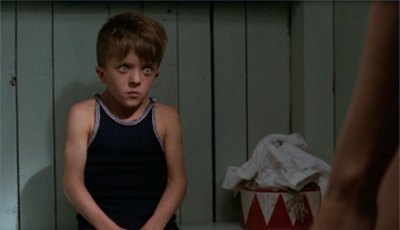
To put it mildly, The Tin Drum isn't exactly an ideal Friday-night family film. Although this story is largely ground in satire and symbolism, viewers who aren't looking for it may be turned off by what they see. While Oskar's first experience with sex may be the first "red flag" for certain viewers, there's more where that came from. One of the film's more infamous scenes depicts a man fishing while using a severed horse's head for bait, while another shows young boys urinating in "boiling frog soup" and forcing others to eat it. While such content is more satirical than gratuitous (especially considering the overall context of the story), it still comes a bit heavy-handed---especially during the latter portions of the film.
Still, The Tin Drum remains a stunning portrait of a special young boy who largely rejects the world around him. As Nazi influence spreads across Oskar's home country, his primary means of defense remain the same: a tin drum and a loud voice. His unwillingness to conform to his environment is what drives this film, and that alone makes it worth viewing---even if you might be very uncomfortable during certain scenes.
The Criterion Collection now presents The Tin Drum in a terrific 2-disc package, coming as a great relief to those who have been unable to find this film on VHS. Featuring a near-perfect technical presentation, Criterion also delivers the goods with a nice assortment of bonus features, most of which feature participation by Director Volker Schlöndorff. From top to bottom, The Tin Drum is a truly stunning release, and will likely rank among the best of the year.
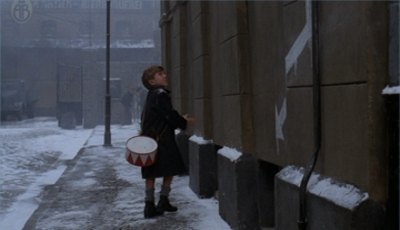
NOTE: Because of small differences between the 5.1 and 1.0 mixes, these audio options can not be switched "on the fly". These two streams of audio are ever so slightly different in speed, and the subtitles wouldn't match up properly if this option weren't available. While it's hard to make a direct comparison between audio mixes because of this, it was an inevitable problem.
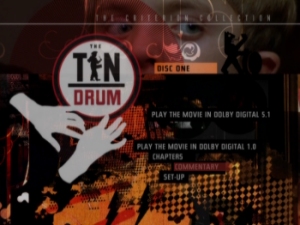
The DVD menus feature the same simple layout and navigation found in most other Criterion releases. This 142-minute film is broken down into 23 chapters, and a layer change was not detected. The packaging for this 2-disc release follows Criterion's tradition of unique and attractive cover designs, and comes packaged in a double-width keepcase. This release also includes an excellent insert, which includes essays by author Günter Grass and film historian Eric Rentschler.
This 2-disc set features a wealth of rare footage and other material, and the quality of these is equally impressive. On Disc One, viewers are treated to an Audio Commentary with Director Volker Schlöndorff, who participates in almost all of the extras for this release. Schlöndorff provides an excellent commentary track, offering a well-organized account of his experiences with The Tin Drum. While a portion of this commentary is focused on the controversy and delicate subject matter, the director also takes time to cover the technical aspects of the film. This invaluable commentary is a great listen from beginning to end, and should be a real treat for fans of The Tin Drum.
Disc Two kicks things off with a brief series of Deleted Scenes (5 minutes), which were discovered during the film's remastering process. Although there is no sound present during these clips, Schlöndorff is on hand to provide commentary for their duration. Next up is more participation from the director, as Volker Schlöndorff Remembers The Tin Drum (20 minutes). Essentially, it's a montage of photos, clips, and storyboards, as Schlöndorff provides more information on the film's production. Next up is the curious News From the Front, a series of French television broadcasts that relate to the film, including comments from the production team and footage from the Cannes Film Festival. Also here is The Platform (10 minutes), perhaps this release's most unique extra. Essentially, viewers are treated to a scene from the film with two audio options available: the original audio, or a direct reading from the book itself (by author Günter Grass) with a musical accompaniment. Our next bonus feature is a text-based supplement that reveals the Original Unscripted Ending of the film, complete with an optional introduction by Schlöndorff.
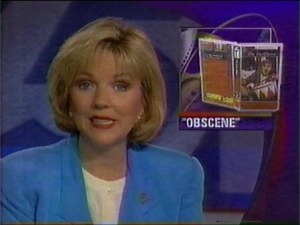
Moving on, we're also given another invaluable extra: Banned In Oklahoma (30 minutes), a short documentary by Gary D. Rhodes. This follows the previously-mentioned banning of the film, and offers an objective look at the initial incident and the eventual trial. Through interviews, news coverage (above), and other footage, you'll swear you're trapped in the middle of 1984 or Fahrenheit 451, but Rhodes does a great job of presenting this surreal event without forcing his own political agenda on the viewer. Winding things down, we're also provided with a Stills Gallery, including designs, drawings, and poster art. Last but not least, we're treated to the film's original Theatrical Trailer, which looks reasonably good for its age. Also, it's worth nothing that these bonus features are also available with optional English subtitles, but only to translate the German dialogue.
The Tin Drum was a film that left a profound impact in its wake, and the included documentary "Banned In Oklahoma" shows how much of an effect it still has. Criterion's 2-disc DVD release features a terrific technical presentation of the film, and a wealth of great supplements. Of particular note is the extensive participation of Director Volker Schlöndorff, whose comments prove to be highly enlightening. Overall, I found The Tin Drum to be an excellent release from top to bottom, and I'd encourage any fan of foreign film to give this one a spin. This film may not be for everyone, but Criterion's 2-disc treatment will thrill those who appreciate it. Highly Recommended.
Randy Miller III is a 1/8 German cartooning instructor hailing from Harrisburg, PA. To fund his DVD viewing habits, he also works on freelance graphic design and illustration projects. In his free time, Randy enjoys slacking off, general debauchery, and writing things in third person.
|
| Popular Reviews |
| Sponsored Links |
|
|
| Sponsored Links |
|
|
| Release List | Reviews | Shop | Newsletter | Forum | DVD Giveaways | Blu-Ray | Advertise |
|
Copyright 2024 DVDTalk.com All Rights Reserved. Legal Info, Privacy Policy, Terms of Use,
Manage Preferences,
Your Privacy Choices | |||||||












